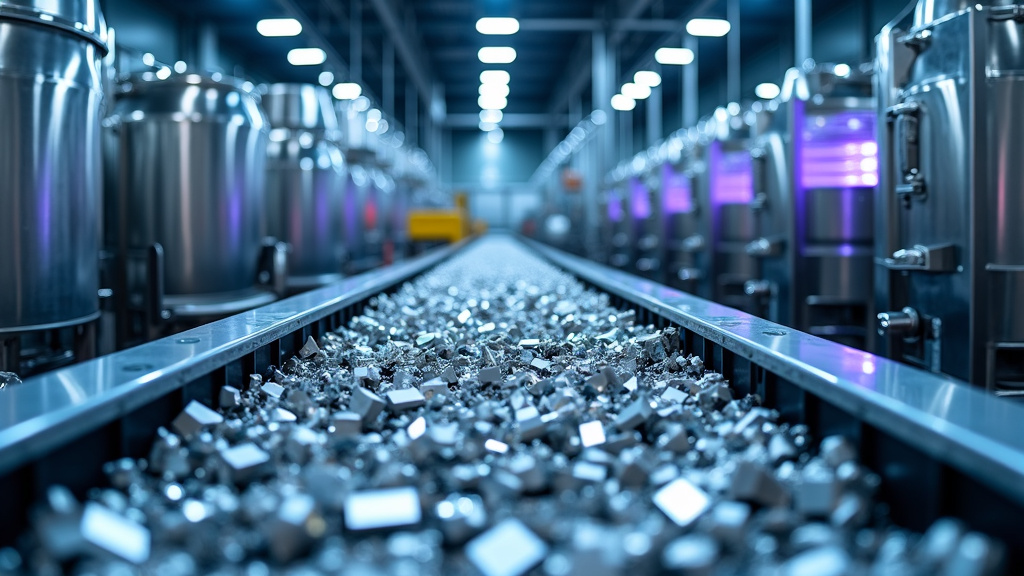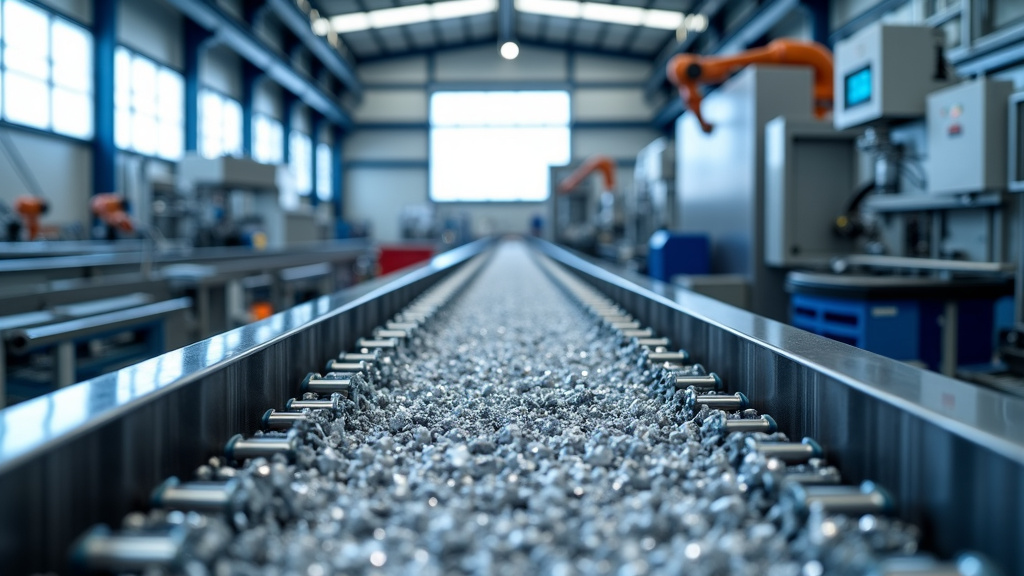5901 Botham Jean Blvd, Dallas, TX 75215
Niobium: The Essential Metal for Sustainable Technology
March 28, 2025Did you know that adding just 0.1% of niobium to steel can double its strength? This remarkable metal, often overlooked but invaluable, is driving sustainable technology across industries. Niobium, a rare element with atomic number 41, is quietly shaping our future in ways most people never realize.
From the sleek bodies of electric vehicles to the powerful turbines harnessing wind energy, niobium’s unique properties make it indispensable in our quest for a greener world. Its ability to enhance strength while reducing weight has made it a cornerstone in aerospace, where fuel efficiency is paramount. But niobium’s impact extends far beyond the skies.
In electronics, niobium is pushing the boundaries of what’s possible. Its superconducting properties are crucial in developing advanced technologies like MRI machines, particle accelerators, and even quantum computers. As we strive for more efficient and powerful electronic devices, niobium stands at the forefront of innovation.
Properties and Applications of Niobium

Niobium, a remarkable metal, boasts an impressive array of properties that make it indispensable in various high-tech industries. Its exceptional strength-to-weight ratio allows engineers to create lightweight yet incredibly sturdy components.
One of niobium’s most notable features is its outstanding corrosion resistance. This quality enables it to withstand harsh environments, making it ideal for use in chemical processing equipment and offshore oil rigs. Niobium’s ability to maintain its integrity under extreme conditions has transformed numerous industrial processes.
Perhaps most intriguing is niobium’s superconducting properties. When cooled to extremely low temperatures, niobium becomes a superconductor, allowing electrical current to flow with zero resistance. This unique attribute has opened up a world of possibilities in scientific research and advanced technology applications.
Niobium in Superconducting Magnets
The realm of superconducting magnets showcases niobium’s extraordinary capabilities. These powerful magnets, integral to many cutting-edge technologies, rely heavily on niobium-based alloys. Magnetic Resonance Imaging (MRI) machines, for instance, utilize niobium-titanium alloys in their superconducting coils.
In particle physics, niobium plays a crucial role. The Large Hadron Collider at CERN, the world’s largest and most powerful particle accelerator, employs niobium-tin superconducting magnets. These magnets generate the intense magnetic fields necessary for bending and focusing particle beams.
Niobium’s superconducting properties also find applications in energy storage systems. Superconducting magnetic energy storage (SMES) devices use niobium-based magnets to store large amounts of electrical energy with minimal losses, potentially transforming grid-scale energy storage.
Niobium in Jet Engines
The aerospace industry heavily relies on niobium for its exceptional properties. In jet engines, where materials must withstand extreme temperatures and stresses, niobium-based superalloys excel. These alloys maintain their strength and stability even under the intense heat and pressure of a jet engine’s combustion chamber.
Niobium additions to nickel-based superalloys significantly enhance their high-temperature strength and creep resistance. This allows jet engines to operate at higher temperatures, increasing their efficiency and performance. The result is more powerful, fuel-efficient aircraft that can fly longer distances.
Moreover, niobium’s low density contributes to weight reduction in aircraft components. This is crucial in the aerospace industry, where every gram saved translates to fuel efficiency and increased payload capacity. Niobium’s role in creating lighter yet stronger jet engines has been transformative for modern aviation.
Niobium in Advanced Steel Alloys
In the steel industry, niobium acts as a powerful alloying element, even in small quantities. When added to steel, it forms fine niobium carbide particles that significantly enhance the metal’s strength and toughness. This property is particularly valuable in the production of high-strength low-alloy (HSLA) steels.
HSLA steels containing niobium find extensive use in the automotive industry. They allow for the creation of lighter, more fuel-efficient vehicles without compromising on safety. Car bodies made with niobium-enhanced steel can be thinner and lighter while maintaining or even improving crash resistance.
The construction industry also benefits from niobium-alloyed steels. These materials enable the design of stronger, more durable structures with less material. Bridges, skyscrapers, and pipelines built with niobium-containing steel can withstand greater loads and harsh environmental conditions, ensuring longer lifespans and reduced maintenance needs.
The Challenges of Niobium Recycling

Niobium recycling is a complex process. This rare metal, valued for its properties in high-strength alloys and superconductors, presents significant challenges due to its intricate metallurgical characteristics. The complexities of separating niobium from other metals require specialized knowledge and advanced equipment.
A major challenge in niobium recycling is its presence in complex alloy compositions. Niobium often forms stable compounds with other metals, resisting simple separation methods. This necessitates advanced processes to break these bonds and isolate pure niobium.
The separation process involves a delicate interplay of chemistry and physics. Conventional methods often fall short for niobium. According to a report by COCIR, niobium forms polymeric complexes in acidic solutions, complicating its extraction. Specialized techniques, such as using hydrofluoric acid, are necessary to effectively separate niobium from its alloy companions.
The challenges extend beyond separation. Purifying niobium to a level suitable for high-tech applications is another significant hurdle. Impurities can drastically affect its properties, making purification crucial and technically demanding. Techniques like electron beam melting and chemical vapor deposition are often required for the necessary purity levels.
Additionally, the recycling process must be controlled to prevent niobium oxidation. Exposure to air at high temperatures forms a stable oxide layer, potentially reducing the yield. This oxidation sensitivity requires controlled atmospheres or vacuum conditions, adding complexity to the recycling process.
The Role of Expert Recycling in Niobium Sustainability
Given these challenges, niobium recycling is not for the ill-equipped. The process’s complexity underscores the need for expert recycling services to ensure niobium resource sustainability. These specialists have the technical expertise and sophisticated equipment necessary for the intricacies of niobium recycling.
Expert recyclers use advanced techniques to address niobium recovery challenges. Some employ electrochemical methods to selectively dissolve and separate metals from complex alloys, while others utilize differing chemical behaviors to achieve separation.
The importance of specialized recycling services goes beyond technical capability. They are crucial in the circular economy of niobium, conserving this resource and reducing the environmental impact of primary extraction. By recovering niobium from end-of-life products and scrap, these experts significantly contribute to sustainability.
Professional recyclers continually innovate to improve niobium recovery efficiency. Research into new separation techniques, such as ionic liquids or advanced solvent extraction methods, promises to overcome current recycling limitations. These developments highlight the field’s dynamic nature and the push towards sustainable practices.
How Okon Recycling Can Help with Niobium

In the dynamic field of metal recycling, Okon Recycling is recognized for its expertise and innovation, especially in niobium recycling. With over a century of experience, Okon excels in reclaiming valuable metals from complex waste streams.
Niobium, a rare and versatile metal essential to industries like aerospace and energy, presents unique recycling challenges. Okon’s advanced facilities are specifically designed to address these challenges. The company’s expert team uses cutting-edge techniques to efficiently recover and process niobium from various sources.
What distinguishes Okon is not just its technical skills but its commitment to customized client solutions. Whether you’re a small business with occasional niobium waste or a large corporation with significant volumes, Okon develops tailored recycling strategies to meet your needs.
Sustainable Solutions for a Circular Economy
Today, responsible waste management is crucial for our planet’s future. Okon Recycling is at the forefront of sustainable niobium recycling. By choosing Okon, businesses contribute to a more circular economy.
Partnering with Okon for niobium recycling offers numerous benefits. Environmentally, recycling niobium reduces the need for new mining operations, conserving resources and minimizing ecological impact. This choice aligns with corporate sustainability goals and demonstrates a commitment to environmental stewardship.
Economically, the benefits are significant. Recycled niobium often retains its valuable properties, making it a cost-effective alternative to newly mined material. This efficient resource use not only reduces waste but can also lead to substantial cost savings for businesses over time.
A Legacy of Trust and Innovation
Okon Recycling’s century-long history in the metal recycling industry highlights its reliability and adaptability. The company continually invests in research and development to stay ahead of industry trends and emerging technologies in niobium recycling.
Okon’s longstanding client relationships across various sectors testify to its commitment to excellence. From aviation giants to energy sector innovators, businesses trust Okon for their niobium recycling needs, emphasizing professionalism, efficiency, and sustainability.
In an industry where precision and purity are critical, Okon’s track record of delivering high-quality recycled niobium is unmatched. The company’s rigorous quality control processes ensure that reclaimed niobium meets or exceeds industry standards, suitable for the most demanding applications.
The Future of Niobium in a Circular Economy

The niobium industry is at a pivotal point. Today’s decisions will influence the sustainability of this vital resource for future generations. By prioritizing responsible recycling, industries can ensure a steady niobium supply while contributing to a sustainable future. This shift towards a circular economy for niobium is both environmentally and economically wise.
Consumers and industry leaders play a crucial role in this transition. Supporting companies that focus on sustainable niobium use and recycling can steer the market towards more responsible practices. The future of niobium is promising, but it requires a commitment to preserving its availability through smart, sustainable choices.
For those seeking to adopt sustainable niobium use and recycling, contact Okon Recycling at 214-717-4083. Together, we can create a circular economy that ensures this invaluable metal’s continued availability for future innovations while minimizing environmental impact.
